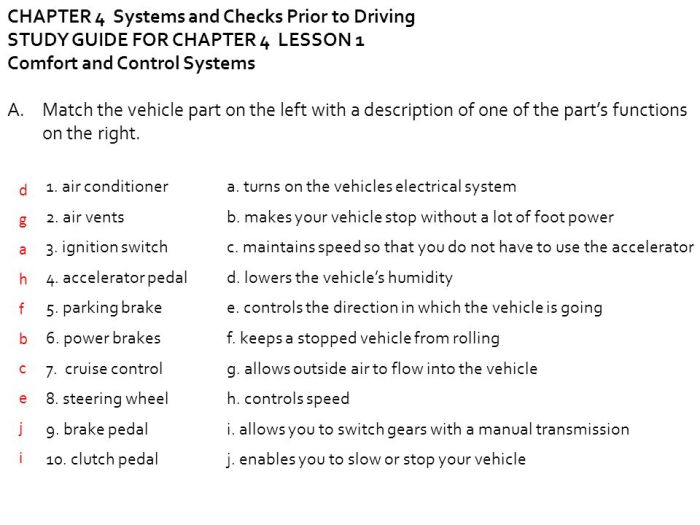Chapter 7 drive right answers – In the realm of Chapter 7 bankruptcy, the “drive right answers” hold immense significance, shaping the course of debtors’ financial futures. This comprehensive guide will illuminate the intricacies of providing accurate and honest responses, ensuring a smooth and successful bankruptcy process.
Understanding the “drive right answers” empowers debtors to navigate the complexities of Chapter 7 bankruptcy with confidence, maximizing their chances of obtaining a discharge and rebuilding their financial lives.
Introduction

Chapter 7 bankruptcy is a legal process that allows individuals to discharge certain debts and get a fresh financial start. It’s commonly known as “liquidation bankruptcy” because the debtor’s nonexempt property is sold to pay off creditors.
Understanding the “drive right answers” in Chapter 7 bankruptcy is crucial because it involves adhering to specific rules and regulations. Debtors must provide accurate and complete information about their assets, debts, and income to ensure a successful discharge of debts.
Understanding the “Drive Right Answers”

During the Chapter 7 bankruptcy process, providing accurate and honest answers to questions is of paramount importance. Debtors should be well-prepared to answer questions about their income, expenses, and assets. This information is crucial for the bankruptcy trustee to assess the debtor’s financial situation and determine eligibility for Chapter 7 bankruptcy.
If you’re looking for the ultimate resource to ace Chapter 7 Drive Right, look no further! This comprehensive guide covers everything you need to know, from the ins and outs of the Blue Mustang featured in The Outsiders to the most challenging concepts.
Whether you’re a seasoned pro or just starting your driving journey, this guide has got you covered.
Key Questions to Prepare For
Debtors should be prepared to answer questions related to the following key areas:
- Income: Debtors must provide detailed information about all sources of income, including wages, salaries, commissions, self-employment income, and any other forms of income.
- Expenses: Debtors must provide a comprehensive list of their monthly expenses, including housing costs, utilities, transportation, food, healthcare, and other living expenses.
- Assets: Debtors must disclose all of their assets, including real estate, vehicles, bank accounts, investments, and any other valuable property.
Tips for Effective Preparation, Chapter 7 drive right answers
To prepare for answering questions effectively, debtors should:
- Gather all relevant financial documents, such as pay stubs, bank statements, and tax returns.
- Create a detailed budget that Artikels their income and expenses.
- Review the bankruptcy petition carefully and ensure that all information provided is accurate and complete.
- Seek professional advice from a bankruptcy attorney if they have any questions or concerns about the bankruptcy process.
Consequences of Inaccurate Answers

Providing inaccurate or misleading information during Chapter 7 bankruptcy can have severe consequences. Debtors who knowingly or intentionally provide false information may face legal and financial penalties, including:
Denial of Discharge
The bankruptcy court may deny a debtor’s discharge if it finds that the debtor has provided inaccurate or incomplete information on their bankruptcy petition or schedules. A denial of discharge means that the debtor’s debts will not be discharged, and they will remain legally obligated to pay them.
Criminal Charges
In some cases, debtors who provide inaccurate information during Chapter 7 bankruptcy may face criminal charges. The U.S. Bankruptcy Code includes several provisions that criminalize bankruptcy fraud, including providing false or misleading information on bankruptcy documents.
Examples of Severe Consequences
There have been numerous cases where debtors have faced severe consequences due to inaccurate answers provided during Chapter 7 bankruptcy. For example, in one case, a debtor was sentenced to 18 months in prison for concealing assets and providing false information on their bankruptcy petition.
Best Practices for Answering Questions: Chapter 7 Drive Right Answers

When answering questions during Chapter 7 bankruptcy, it is crucial to be accurate and honest. This helps ensure a smooth and successful bankruptcy process.
Gather documentation to support your answers. This includes financial statements, tax returns, and any other documents that provide evidence of your financial situation. Having these documents on hand will make it easier to answer questions accurately and thoroughly.
Communicating with Creditors and the Bankruptcy Trustee
Communicate effectively with creditors and the bankruptcy trustee. Be responsive to their inquiries and provide complete and accurate information. Answer questions clearly and concisely, and avoid using jargon or technical terms that may not be understood.
If you are unsure about how to answer a question, do not hesitate to ask for clarification. It is better to take the time to understand the question and provide an accurate answer than to guess and potentially provide incorrect information.
Additional Resources

Navigating Chapter 7 bankruptcy can be complex, and accessing reliable guidance is crucial. Numerous resources are available to assist debtors in answering questions and making informed decisions.
Government websites, legal aid organizations, and reputable sources provide comprehensive information and support.
Government Websites
- United States Bankruptcy Court: https://www.uscourts.gov/services-forms/bankruptcy provides official bankruptcy forms, instructions, and general information.
- U.S. Department of Justice: https://www.justice.gov/ust/bankruptcy offers resources on bankruptcy law, including consumer protection and fraud prevention.
Legal Aid Organizations
- Legal Services Corporation: https://www.lsc.gov/find-legal-aid helps low-income individuals find free or low-cost legal assistance, including bankruptcy representation.
- National Legal Aid & Defender Association: https://www.nlada.org/find-legal-aid provides a directory of legal aid organizations across the country.
Other Reputable Sources
- American Bankruptcy Institute: https://www.abi.org/ is a professional organization that provides educational resources and advocates for bankruptcy reform.
- National Association of Consumer Bankruptcy Attorneys: https://www.nacba.org/ is a non-profit organization that represents bankruptcy attorneys and provides consumer education.
Legal Assistance
Consulting with an attorney is highly recommended. An experienced bankruptcy lawyer can provide personalized guidance, help you understand your rights and options, and ensure that your interests are protected throughout the process.
FAQ
What is Chapter 7 bankruptcy?
Chapter 7 bankruptcy is a type of bankruptcy that allows individuals to discharge most of their debts and start over financially.
Why is it important to provide accurate answers in Chapter 7 bankruptcy?
Providing inaccurate answers can lead to the denial of your discharge or even criminal charges.
What are some of the key questions that debtors should be prepared to answer?
Debtors should be prepared to answer questions about their income, expenses, assets, and debts.
What are some tips for preparing for and answering questions effectively?
Gather documentation to support your answers, be honest and upfront, and communicate effectively with creditors and the bankruptcy trustee.